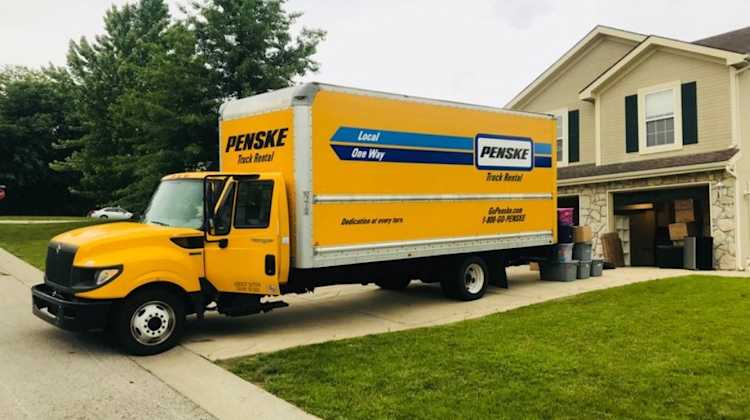Webinar: PCS Claims Explained
by Lizann Lightfoot - July 15th, 2022

Who can file a PCS claim and where?
Most claims have to be filed through the DPS portal, which can be accessed through MilitaryOneSource.com. The service member or spouse can file, as long as they have login information and access to the CAC card.
What is the PCS claims process?
We can’t always troubleshoot when you get stuck in DPS because we see a different screen, so we encourage you to call the DPS Help Desk at 1-800-462-2176. During peak season, the wait times can be long on DPS, but you can go to Military OneSource to open a ticket, or get a phone call back when the wait times are up.
What documentation should go in my PCS damage claim?
When filing a claim, you need to enter an inventory number, make and model of the item, condition of the item, purchase cost, claimed amount, and purchase year. That all needs to be filed in DPS.
Read more details here about filing your damage claim when you PCS.
What about residential damage during a PCS?
Some claims don’t need to be filed in DPS. These are physical damage to property or structures--residential damage like a dent in your wall from the mover. These can be filed directly with the TSP (Transportation Service Provider). The same is true for delay claims and inconvenience claims-- file directly with the TSP.
Catastrophic claims and the Military Claims Office (MCO)
For catastrophic losses like fire damage, water damage, or mold, your TSP can reach out to the Military Claims Office (MCO) which secures a waiver from the government to use paper documents outside of DPS. This saves time, since it would take forever to file hundreds of lines of items in those cases.
Who handles my PCS claim?
You could be communicating with the Transportation Service Provider,, a Move Manager, or a claims company that is handling something. It depends on the stage of your move. Some TSPs handle their claims in-house, but others use a 3rd party claims company.
Read more about the claims process in our previous webinar here.
How long do I have to file a PCS claim?
The old rules allowed a service member to notify the TSP about loss or damage within 75 days of delivery. As of two years ago, that time period was extended, and you now have up to 180 days after delivery to file a claim. This is useful for holiday decorations, or a small item left wrapped in a box. So you now have 180 days to give notice and intent to file a claim.
What about items not listed on the box when PCSing?
Typically, not every item in a box will be listed on the outside. But it should be a general idea of the contents and the room they came from. So if the blender is damaged, and it came from a box marked “kitchen items,” there shouldn’t be any issue filing that claim. But if you claim a wedding dress from the box labeled Kitchen, then there are going to be some questions.
Documentation of items during a PCS
If you store items in closets or guest bedroom areas, then take a picture of the broken item coming out of the box with the more general label, so we have documentation of the item and the box number. The more you document, the easier it is to file.
If you group your similar items together before moving day, it will be more likely that items will be grouped and labeled together in a more logical way, so take pictures of these groups or piles of items on moving day as they are packed, and also on the receiving side as they are unpacked. Pictures can always help substantiate your claims.
Lost During My PCS
PCSgrades helps reunite people with their lost and found PCS items through our private Facebook group, which has over 42 thousand members! People share pictures of items they are missing, and also share pictures of things that were delivered to them by mistake. Over the years, we have reunited so many unique and wonderful items with their owners!
Join the Lost During My PCS Facebook group here.
Follow the new Lost During My PCS Instagram page here.
High-value and high-risk inventory for PCS
Typically, items that are more than $100 per pound and are either collectable or rare can be labeled on the high-value inventory. Things that are financially valuable are called high-value. Sentimental or important items can be considered high-risk because they are irreplaceable. It’s important to communicate with your movers to let them know what is high-risk or high-value to you. Officially, this inventory should be used for collectibles, jewelry, silverware, silver sets, etc.
Proof of ownership for items during PCS
Document, document, document! Look for old credit card charges, bank statements, or a receipt from the store. Take pictures of these items before you move. Items like couches or high-end furniture have the brand name stitched into the furniture, or there may be a barcode underneath. Taking these photos before the pack-out day can be proof of ownership for your claims.
What is the PCS claims timeline?
This has changed over the past few years. Once you file in DPS, the TSP has 15 days to acknowledge that the service member has filed the claim. They should email you to make contact and acknowledge that they are working on it. If it is worth $1,000 or less, they have 30 days to make an offer on the claim. If it is $1,001 or greater, then they have 60 days to make an offer.
If you haven’t heard from them, reach out to your TSP and find out who should be handling that claim.
PCS high value inventory sheets
A high value item should appear on both the high value inventory sheet and the regular inventory. One of the more recent changes that we have seen is for people who have collections of expensive shoes or clothing. If the box is simply labeled “shoes,” but it contains collectible Air Jordans, with the basic reimbursement rate for shoes you probably will not get full replacement value of your collection.
Firearms should always be listed on the high value inventory sheet with make, model, and serial number.
Label on boxes vs. inventory sheets for PCS
People are sometimes concerned when a box doesn’t have enough specific details. But movers are allowed to use generic words like “accessories” on the box instead of “Coach purses,” for security reasons. But those details need to appear on your high risk and high value inventory sheet.
Inconvenience Claims 101
Inconvenience Claims are filed directly with the TSP. They should not go through DPS. Inconvenience Claims or Delay Claims are for a missed delivery date or a missed storage delivery date. You put in a preferred delivery date (RDD), and the TSP can deliver within seven days of that date. They have two days of leeway on the tail end of that to make a delivery without it being considered late.
If you are out of pocket for a missed RDD or a missed pickup, then you want to file that claim as soon as possible.
There are two options to exercise your rights on an Inconvenience Claim. The receipt-free option is Meals and Incidentals for the service member only, per day, for up to seven days. Or you can save receipts, and be reimbursed for up to your full per diem. (View the Per Diem Calculator here). This can help cover a hotel stay, or temporary items like air mattresses, pillows, towels, shower curtains, etc. to get you through several days until your delivery arrives.
Your TSP should send you a document called DP3 Shipment Inconvenience Claims form. This tells you what receipts to hold onto, how the claim will work, and all the details you need.
How do I dispute an offer for a PCS Claim?
It’s definitely in your right to dispute a claim that doesn’t seem fair to replace your item. Both parties--the service member and the TSP or the claims company--need to find a common ground. If they can’t agree, there is a process to submit the dispute to a Military Claims Office (MCO). The service member can agree with some or any items on their claim, while disputing others. You will be paid by the TSP for the ones you agree on, then the other items will move to the MCO. If the government feels you are due something, then they will pay you and settle directly with the TSP. The service member gets taken care of, and the government will handle an agreement with the TSP, so everyone is happy.
When and how to elevate to the Military Claims Office (MCO)
There are situations where claims definitely need to go to an MCO. Let’s say you have provided all the substantiation, and you’re being offered a TV that is smaller, or an item that just isn’t comparable. But let’s remember that electronics do depreciate over time, so it can be very difficult to find that common ground. “Like, kind, and quality” are the three factors that the claims office looks at for full replacement value.
Payment is based on today’s value of the item at your current location. So your TV is probably no longer worth what you paid for it. It should be the replacement value of an item of similar like, kind, and quality at your location. This can be especially difficult if you are stationed overseas or in a place where it is harder to get items shipped to you.
What about extensive mold or water damage during a PCS?
This is always a possibility, especially during long shipments of goods overseas. First, don’t let those damaged items inside your home. We all have to do our best to limit damage or contamination to any real property. Don’t introduce the household goods to the house, because then you have to mitigate the damage to the house too. The goods should go back to the local agent’s facility and be evaluated there for damage and mitigation options by a ServePro professional. The TSP should get the base involved and communicate throughout the mitigation process.
While the items are shipped back, you would be entitled to an Inconvenience Claim or a Delay Claim. If it is an essential item like a mattress, the TSP should replace it right away. Other items can be handled with a Delay Claim by renting furniture.
RAPID FIRE Round!
Tips for full replacement value of a PCS claim
If an item is damaged, you will receive the repair or the replacement cost--whichever is the lesser of the two. Save your receipts to document the value of your items. Know the rules! All the rules that your TSP should be following are the Claims Liability Business Rules. You can read a pdf of the 2022 rules here.
Best tips to avoid PCS claims
You can’t be in every room at once, so try to do your best to limit pets and kids running around on moving day. If you see something unusual, or not right, then stop everyone immediately If items are being mishandled, call the TSP, call Quality Control, and do what you can to get everyone back on the same page to prevent damage to your belongings.
Do I keep broken and damaged items after a PCS?
Yes, you do. You need to retain damaged items until the claim gets settled. The TSP has 30 days to execute any salvage rights. If it is a hazardous item like picture frames with broken glass, then no one expats you to keep that. Document it and take pictures, but then throw away the hazardous material. But reach out to the TSP first before you dispose of any items.
How long does the TSP have to respond to PCS claims?
They have 15 days to acknowledge receipt of a claim, then 30 days to make an offer if the claim is worth $1,000 or less, and 60 days to make an offer if the item is $1,001 or more.
Are there tools to help military families with PCS claims?
You can upload photos, pdfs, receipts, and other documents into DPS. That’s my biggest recommendation, so you don’t have to go back through emails. Use DPS whenever possible. We know there are challenges, but they have been updating it to make it more stable over the past 6 months, so it should be stable for you to review and share information with your TSP.
Our Guest: Michael Czarnecki, VP of National Claims Services, Inc.
11 years ago, I was hired at National Forwarding Company as a Move Manager, which involved confirming a lot of information with service members and bases. A year later, I moved into Claims and have focused on those ever since!









